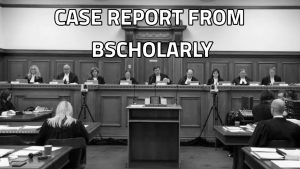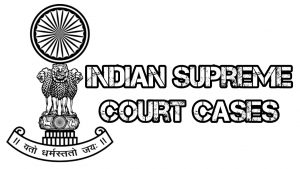Facts, Issues and Judgment of Court In Minerva Mills v Union of India: The constitution of a country is its basic law. It is the law that establishes the governmental bodies and empowers them. It is the foundation of all laws in a country; the law from which other laws derive validity.

The Constitution prescribes the powers of the executive, legislative and judicial arms of government and the different tiers of government as well. The Constitution also guarantees fundamental human rights by providing for them and also, prescribing a means of enforcing them.
The Fundamental human rights have been described as inalienable and immutable.
Empowered to make laws, the legislative arm of government is also empowered to amend laws. The Constitution, being one of the laws of the country, is also subject to amendment, whether such amendment is rigid or flexible. The Constitution usually prescribes the procedure to follow in the amendment of laws, and in the amendment of the Constitution itself.
A question which has been severally litigated on is the question of the extent which the legislative arm can go in the amendment of the Constitution.
In the case of Kesavananda Bharati Sripadagalvaru & Ors v State of Kerala & Anr, the basic structure doctrine was expounded to state that the legislature will retain its power of amendment to the extent that it does not destroy the basic structure of the Constitution by ousting the power of the court to judicial review and abrogating fundamental human rights guaranteed by the Constitution.
The case of Minerva Mills v. Union of India, applied the basic structure doctrine of the Constitution of India, as expounded in other cases, and considered, yet again, the extent of the power of the parliament.
Recommended: Smith v Selwyn: Facts, Issues and Judgment of Court
Fact summary of Minerva Mills v Union of India
After observing the low level of production in Minerva Mills, a textile mill, the Central government appointed a committee to look into it. When a report was submitted by the committee in 1971, the Central Government authorized the National Textile Corporation Limited, formed under the Industries Development Act of 1951, to take over management of the company.
Afterwards, the parliament made the 39th amendment of the Constitution which provided for nationalization and ousted the judiciary’s power of judicial review. Then the 42nd amendment was passed to amend Article 31C of the Constitution.
The amended provision stated that where a law is made to give effect to the Directive Principles, such law could not be voided on the basis of its violating the right to freedom of speech and the right to freedom of expression, as guaranteed by Article 14 and Article 19 of the Constitution.
Also, in Clauses 4 and 5 of Article 368 of the Constitution, it is provided that no amendment of the Constitution, including an amendment to Part III of the Constitution, shall be questioned by the court on any ground; and that there is no limitation to the power of the parliament to amend, respectively.
The validity of Section 4 and 55 of the 42nd Amendment of the Constitution which amended Article 31C and Article 368 of the Constitution, was challenged by the petitioners.
The petitioner argued that in the case of Kesavananda Bharati Sripadagalvaru & Ors. v. State of Kerala & Anr., it had already been decided by the court that the parliament’s power was limited to the extent that they could not tamper with the basic structure of the Constitution.
The petitioner also argued that the Directive Principles could not take priority over the fundamental human rights.

Also read: Characteristics of customary law
Issues determined in Minerva Mills v Union of India
a. The validity of Section 4 and 55 of the 42nd Amendment of the Constitution.
b. The constitutionality of Clause 5 of Article 368 of the Constitution of India.
c. Whether or not the Directive Principles have primacy over the fundamental rights guaranteed by the Constitution.
d. Whether the basic structure of the Constitution has been affected by the amendment.
Also see: Exceptions to the rule of delegatus non potest delegare
Judgment of the court in Minerva Mills v Union of India
This case was decided in the Supreme Court of India.

The Constitution limits the power of the parliament of India to amend the constitution as can be seen in Article 13 of the Constitution, which provides that law in derogation of the fundamental rights are void and that the state must not make laws that are not in conformity with the provisions of the Constitution.
However, Clause 5 of Article 368 of the Constitution of India provides thus:
For the removal of easy doubts, it is hereby declared that there shall be no limitation whatever on the constituent power of Parliament to amend by way of addition, variation or repeal the provisions of this Constitution under this article.
What this means is that the constituent parliament has no limitation under the article, to amend the provisions of the Constitution.
The court held that the above provision is unconstitutional. The parliament can not grant itself unlimited power, and in the bid to amend the Constitution, it cannot be allowed to destroy the Constitution.
Since a basic element of the Constitution is the fact that the parliament has limited power, that power cannot be made unlimited by the parliament itself, as it attempted to do in the 42nd Amendment of the Constitution. It stated that the parliament is the donee of the power given in the Constitution and cannot become the donor, at the same time.
The court held that if the parliament was allowed to have unlimited power, democracy would be alienated and tyranny will reign.
Thus, Section 4 of the 42nd Amendment was found to be unconstitutional.
Section 4 of the 42nd Amendment attempted to confer primacy to the Directive Principles of State Policy over the fundamental human rights guaranteed in the Constitution.
It is curious that clauses (3), (4) and (5) of Article 368 provide that Article 13 would not apply to amendments made under Article 368; that no amendment of the Constitution, including an amendment of Part III, shall be questioned by the court on any ground; and that there is no limitation of the constituent power of the parliament to amend the provisions of the Constitution, respectively. These provisions seem to create an opportunity for the abrogation of fundamental rights by the parliament and encourage tyranny and thus, it is no wonder that the court refused to allow them to operate.
Also see: How to answer law problem questions using IRAC Method
Conclusively, as much as power is given to make laws, such power has to be checked by the court as prescribed by the principle of checks and balances and this is what was done in the instant case.

Edeh Samuel Chukwuemeka, ACMC, is a lawyer and a certified mediator/conciliator in Nigeria. He is also a developer with knowledge in various programming languages. Samuel is determined to leverage his skills in technology, SEO, and legal practice to revolutionize the legal profession worldwide by creating web and mobile applications that simplify legal research. Sam is also passionate about educating and providing valuable information to people.